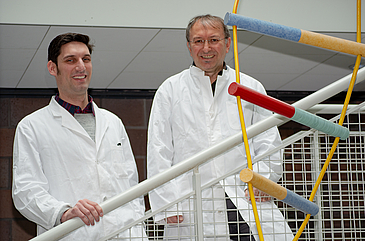Testicular cancer is the most common malignant tumor in young men between 20 and 40 years of age. Determining the concentration of so-called biomarkers in patients’ blood is an important tool for assessing the course of the disease – but for a long time doctors lacked reliable biomarkers. A first important step forward was therefore the discovery of an extremely promising biomarker in 2012. A working group led by human geneticist Dr. Gazanfer Belge from the University of Bremen demonstrated the effectiveness of this marker in eleven patients with testicular cancer.
37 European Clinics Involved
Even though a first step has been made in medical research, many more generally have to follow before an important discovery one day ends up in clinical routine. “No doctor in the world will rely on biomarkers that have been tested on only a dozen patients,” says Belge. The startling discovery seven years ago prompted the Wilhelm Sander-Stiftung für Krebsforschung (foundation for cancer research) to set up a follow-up project funded with 170,000 euros. The third-party funding enabled a multiyear, multicenter study in which 37 urology and oncology clinics in various European countries participated. “Over the past three years, the biomarker has been tested on more than 600 patients and has undergone considerable further development,” said the human geneticist.
The result was that the biomarker, which was researched and developed at the University of Bremen, is now extremely sensitive and therefore highly accurate. “After testicular cancer treatment with chemotherapy or radiation, success is checked with the help of imaging procedures and blood tests. The biomarker we developed correctly indicates, in 94% of healthy cases, that the patients treated are actually negative for germ cell tumors,” explains Dr. Arlo Radtke, who conducted the study together with Gazanfer Belge. “For the medical sector, this means a very good detection rate. The study has shown that the biomarker is a safe tool for both initial diagnosis and post-treatment monitoring.”
183,000 Euros for Follow-Up Study
On the clinical side, Professor Klaus-Peter Dieckmann from the Asklepios Hodentumorzentrum West (testicular tumor center) in Hamburg-Altona was one of the most important medical experts involved. He confirms the high efficacy of the biomarker named miR-371-3p: “From a practitioner’s point of view, the new tumor marker is an important tool in the aftercare of testicular cancer patients.” Due to the renewed positive results, the Deutsche Krebshilfe foundation has decided to finance another follow-up study with 183,000 euros. The project will run for two years and aims to clinically establish the biomarker for the aftercare of testicular tumor patients.
Dr. Arlo Radtke will also be involved in the important step from feasibility in the laboratory to creating a marketable product ready for application. After completing the study, which was financed by the Wilhelm Sander-Stiftung, he joined the team of the young start-up miRdetect GmbH, which plans to market the new serous tumor marker for testicular cancer. The company was founded with the help of existing federal funding by the former Bremen university researchers Meike Spiekermann and Nina Winter. Both had worked together with Gazanfer Belge until 2015.
Publication in Prestigious Scientific Journal
The results of the Bremen study have attracted a great deal of attention among experts and have now been published in the Journal of Clinical Oncology. With an impact factor of 26.3, the publication is one of the most important scientific journals in the world. The number reflects the influence of a scientific journal and shows how often the articles of a particular journal are cited in other publications.
Additional Information:
Article in the Journal of Clinical Oncology: ascopubs.org/doi/abs/10.1200/JCO.18.01480
www.uni-bremen.de
Contact:
PD Dr. Gazanfer Belge
University of Bremen
Department of Biology/Chemistry
Tel.: +49 421 218-61570
E-mail: belge@uni-bremen.de

